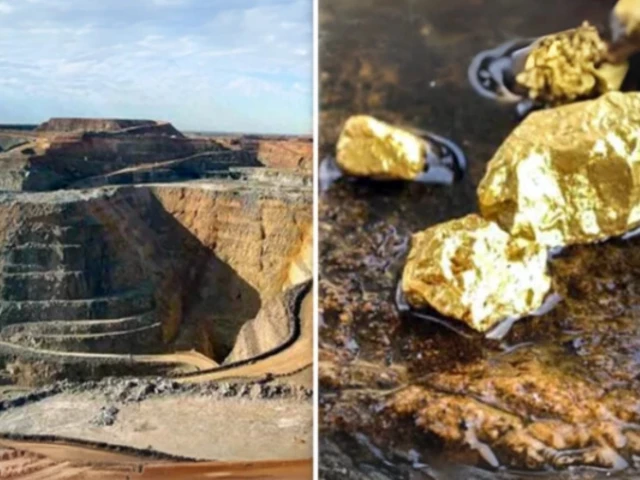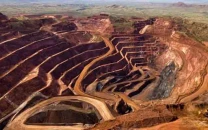Reko Diq project cost raised to $7.7b
Hike comes as ECC backs fresh loan guarantees, $390m rail link financing

Pakistan on Thursday revised upward the cost of the first phase of the Reko Diq copper and gold mines project for the second time in six months. The cost has now jumped 79% to $7.7 billion from the initial estimate due to higher cost of loans being taken for the project and to offset any future price shocks.
The Economic Coordination Committee (ECC) of the Cabinet approved the second revision in the total cost of the first phase of the project. Finance Minister Muhammad Aurangzeb chaired the meeting. The ECC also cleared signing of implementation agreements to formally launch the strategically important project.
In addition, the ECC approved sovereign guarantees to support a $390 million loan to be taken by the Reko Diq Mining Company to finance Pakistan Railways for construction of an 880-kilometer rail track. This line will transport minerals to Karachi seaport.
The ECC raised the total project cost for Phase-I to $7.72 billion. This includes $5.8 billion in capital expenditure.
This is the second revision in six months. In March this year, the ECC had approved raising the cost to $6.8 billion.
A finance ministry handout said the ECC considered a summary by the Petroleum Division. The summary related to approvals for definitive agreements and financial commitments for the Reko Diq project.
"The ECC approved the proposed final terms of the agreements," the statement said. It added that if legal and financial advisers, along with the Reko Diq Mining Company, identified any material deviations, these would be sent back to ECC for approval.
The finance minister observed that inclusion of contingency costs showed the company's concerns about risks in the implementation of the project. He urged authorities to take all steps to finish the project on time.
Two and a half years ago, the project had been estimated at $4.3 billion. It is now up 79% or $3.4 billion before production even begins.
Phase II is due in 2034 at an additional cost of $3.3 billion. This will raise capacity to 90 million tonnes per annum (Mtpa), states the report. With this, the total project cost will touch nearly $10 billion.
The ECC also approved raising the debt component from $3 billion to $3.5 billion. The extra $500 million borrowing adds another $180 million in interest cost.
Officials informed the ECC that the increase was due to around $2 billion in project financing needs. Inflation during construction, operating costs during the construction period, and pre-2025 expenses also pushed up the figure, according to finance ministry officials.
Due to the higher debt, the shareholders' contribution has also risen by $458 million. However, Reko Diq Mining Company is still trying to keep the cost under $7 billion. If successful, shareholder commitments would drop to $3.5 billion.
The first revision had been based on a new feasibility and technical report prepared by Barrick Gold, which holds 50% of the project.
The project is of global interest, attracting both the US and China. Its net cash flow over 37 years is projected at $70 billion. That is almost 10 times Pakistan's current foreign exchange reserves.
The technical report says production will begin by end-2028. The mine will initially yield 200,000 tonnes of copper a year in Phase-I at a cost of $5.7 billion. Completion of this first phase is expected in 2029.
Pakistan's shareholding is split between three federal companies – the Oil and Gas Development Company Limited (OGDCL), Pakistan Petroleum Limited and Government Holdings (Private) Limited. Each holds 8.33%, making a combined 25% stake. Another 25% is held by the Balochistan government, while Barrick Gold owns 50% and is the operator.
The ECC was also briefed on the draft long-form term sheet. This sheet outlines common terms for lenders and will form the basis of definitive agreements.
These agreements include a Government Direct Agreement with lenders, a federal Guarantee Agreement, a Balochistan Completion Agreement, SOEs Completion Agreement, and a Transfer Restrictions Agreement.
The ECC allowed the SOEs to repatriate funds from January 2023 over seven years or longer. This will meet their $2.2 billion funding share.
It also allowed OGDCL and PPL to arrange foreign exchange from their own resources. If they face shortfalls, the federal government will provide foreign exchange.
The ECC also authorised the petroleum and finance secretaries to finaliae execution forms of the agreements.
Rail project
The ECC also reviewed a railway ministry summary. It related to a rail development agreement and a bridge financing agreement with Reko Diq Mining Company. The company will extend $390 million in bridge financing to lay a 1,350 km track from Balochistan to Karachi, said the finance ministry.
The ECC approved the proposal. It directed the railway ministry to share the documents with the Finance Division for appraisal. It also asked both ministries to submit an implementation update by March next year.
Petroleum Minister Ali Pervaiz Malik stressed monitoring of the project so that Pakistan Railways can return the $390 million with interest in three years.
The finance minister said ECC's approvals signalled the government's commitment to Reko Diq. He said the project could transform Balochistan's economy and benefit the whole country.
He added that Reko Diq would unlock one of the world's largest undeveloped copper-gold deposits. It would create jobs, improve infrastructure, and support long-term socio-economic growth.
The rail link is essential for the project's commercial success. It will allow shipment of copper concentrate for processing and sale abroad. The mining company has favoured a rail link via Port Qasim, connecting ML-III and ML-I.
The $390 million financing, approved by the prime minister last month, will carry a three-year tenor at about 7% interest. The existing ML-III track from Nokundi to Rohri needs urgent upgradation. Without it, the line cannot handle the projected heavy freight traffic from Reko Diq to Karachi Port.























COMMENTS (1)
Comments are moderated and generally will be posted if they are on-topic and not abusive.
For more information, please see our Comments FAQ